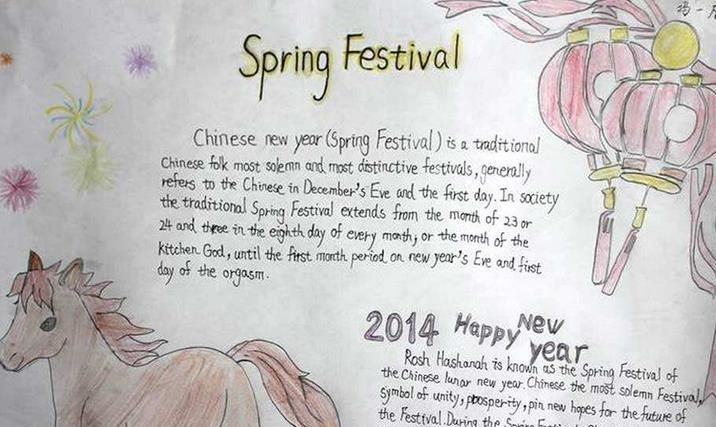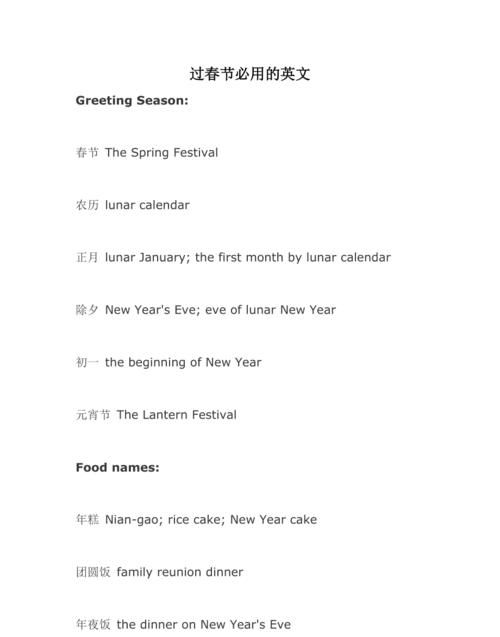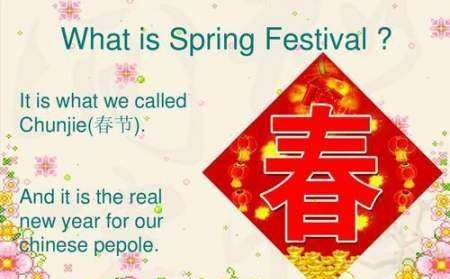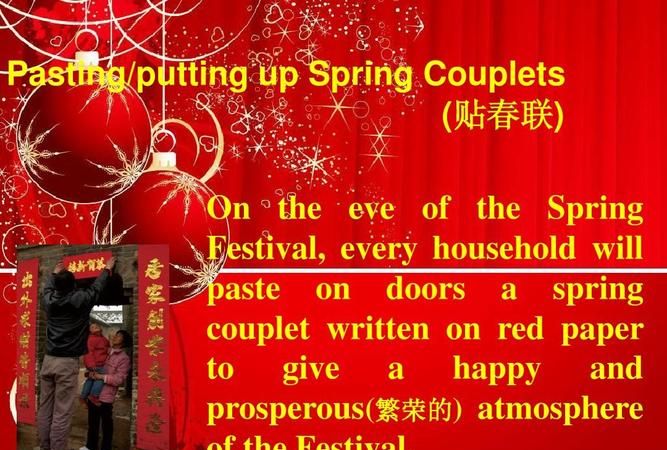本文目录
关于春节的英文知识20字
2006-5-9 14:06:17
Spring Festival Words—春节用语
一年一度的春节又已来临,春节既是中华民族最重要的传统节日,又是中华传统文化的一个缩影,对春节文化的研究已是中外许多学者的一个永久性研究课题。本文特介绍一部分与春节有关的英文词汇,希望能对读者阅读有关春节题材的英语文章或想了解有关春节方面知识有一些帮助。
Greeting Season:
春节The Spring Festival
农历lunar calendar
正月lunar January; the first month by lunar calendar
除夕New Year's Eve; eve of lunar New Year
初一the beginning of New Year
元宵节The Lantern Festival
Customs:
过年Guo-nian; have the Spring Festival
对联poetic couplet: two successive rhyming lines in poetry
春联Spring Festival couplets
剪纸paper-cuts
年画New Year paintings
买年货special purchases for the Spring Festival ; do Spring Festival shopping
敬酒propose a toast
灯笼lantern: a portable light
烟花fireworks
爆竹firecrackers (People scare off evil spirits and ghosts with the loud pop.)
红包red packets (cash wrapped up in red paper, symbolize fortune and wealth in the coming year.)
舞狮lion dance (The lion is believed to be able to dispel evil and bring good luck.)
舞龙dragon dance (to expect good weather and good harvests)
戏曲traditional opera
杂耍variety show; vaudeville
灯谜riddles written on lanterns
灯会exhibit of lanterns
守岁staying-up
拜年pay New Year's call; give New Year's greetings; New Year's visit
禁忌taboo
去晦气get rid of the ill- fortune
祭祖宗offer sacrifices to one's ancestors
压岁钱gift money; lucky money; money given to children as a lunar New Year gift
辞旧岁bid farewell to the old year
扫房spring cleaning; general house-cleaning
Blessing:
恭喜发财: May you be prosperous!
祝你新的一年快乐幸福: Wish you happiness and prosperity in the coming year!
大吉大利: May you very lucky, very auspicious in the new year! Wish you all the best!
事业成功,家庭美满: Wish you success in your career and happiness of your family!
Food names:
年糕Nian-gao; rise cake; New Year cake
团圆饭family reunion dinner
年夜饭the dinner on New Year's Eve
饺子Jiao-zi; Chinese meat ravioli
汤圆Tang-yuan; dumplings made of sweet rice, rolledsintosballs and stuffed with either sweet or spicy fillings
八宝饭eight treasures rice pudding
糖果盘candy tray:
什锦糖assorted candies - sweet and fortune
蜜冬瓜candied winter melon - growth and good health
西瓜子red melon seed - joy, happiness, truth and sincerity
金桔cumquat - prosperity
糖莲子candied lotus seed - many descendents to come
糖藕candied lotus root - fulfilling love relationship
红枣red dates - prosperity
花生糖peanut candy - sweet

春节英语知识点
I like the Chinese new year better than any other festival. This is a time especially for rest and joy. I need not study. I wear good clothes and eat good food. I have a good time from morning till night. I am as happy as a king.
我喜欢中国新年比喜欢其它任何节日更甚。这是一个专为休息和欢乐的时间。我不需要读书。我穿好衣服,吃好东西。我每天从早到晚日子过得轻松愉快。我和上帝一样快乐。
2.
春节是中国民间最隆重的传统节日。在夏历正月初一,又叫阴历年,俗称“过年”、“新年”。春节的历史很悠久,它起源于殷商时期年头岁尾的祭神祭祖活动。按照我国农历,正月 初一古称元日、元辰、元正、元朔、元旦等,俗称年初一,到了民国时期,改用公历,公历的一月一日称为元旦,把农历的一月一日叫春节。
Lunar New Year , the most solemn of traditional Chinese folk festivals. First day of the first lunar month in the traditional Chinese lunar calendar, known as the Moon, commonly known as "New Year" and "New Year." The long history of the Spring Festival, which originated in the Shang period the year draws to a close servicemen and the memorial activities. According to China's Lunar, the first day of the first lunar month yen ancient name, Yuan-chen, a copy, is Emperor, the New Year Day, which is commonly known as Day of the Republic. switch to the Gregorian calendar, the calendar on January 1 as New Year's Day, January 1st called the Lunar Spring Festival.

喜欢春节的原因有哪些英语
1、I like the Chinese new year better than any other festival, This is a
time especially for rest and joy,I need not study, I wear good clothes
and eat good food, I have a good time from morning till night, I am as
happy as a king。
我喜欢中国新年比喜欢其它任何节日更甚。这是一个专为休息和欢乐的时间。我不需要读书。我穿好衣服,吃好东西。我每天从早到晚日子过得轻松愉快。我和上帝一样快乐。
2、Lunar
New Year , the most solemn of traditional Chinese folk festivals, First
day of the first lunar month in the traditional Chinese lunar calendar,
known as the Moon,commonly known as "New Year" and "New Year。
春节是中国民间最隆重的传统节日。在夏历正月初一,又叫阴历年,俗称“过年”、“新年”。

3、Spring
festival is coming,Spring Festival is on the traditional Chinese
festivals,People used to call it "the Lunar New Year",It always starts
between january the first and february the twentieth。
春节到了,春节是中国的传统节日,人们习惯上成作农历年.这个节日总是在每年的一月初到二月中旬之间.
4、Shortly
before the festival,Chinese people are busy shopping, They buy
vegetables,fish,meat and new clothes and many other things。They clean
the houses and decorate them。
春节前的一段日子,中国人早早地开始买年货,他们买蔬菜,鱼和肉,新衣服和种种其他的东西,他们打扫房屋,把自己的家布置一新。
5、The
Chinese New Year is a festival whose Chinese are most important,The
history of the Chinese New Year is very long,Stanza front stick in an on
the face the New Year's Day of the implied meaning of the yellow word
in red paper in top send message by word and the god of wealth resembles
with hang deep red lantern etc。
春节是汉族最重要的节日。春节的历史很悠久。节前就在门脸上贴上红纸黄字的寓意的新年寄语及财神像和挂大红灯笼等。
关于春节的英语内容大全
1.正月十五的元宵滚进二月二龙抬头的锣鼓声中。人们唱戏跳舞迎祥龙,为的是盼个风调雨顺的好年成。之后就是布谷催种,细雨绵绵的季节了。这时的乡村一身才气,大雁翱翔成标题,禾苗舒展成字句,小河延伸成花边,蜂儿蝶儿飞进去,飞进去便成了新春专版的题花……
Fifteenth day of the Lantern Festival roller-February 2-percussion sound of the rise. Ying Xianglong people operas, dance, I hope for a favorable weather is good Ningcheng. Followed by reminders of Bulu, the season of the continuous rain. This time, a Talent Village, Dayan flying into heading Hemiao stretch into words, a stream extends into lace, bee flying into Dieren children, will fly into the feature pages of a spring flower that……
2.贴春联
据说贴春联的习俗,大约始于一千多年前的后蜀时期,这是有史为证的。此外根据《玉烛宝典》,《燕京岁时记》等著作记载,春联的原始形式就是人们所说的“桃符”。
在中国古代神话中,相传有一个鬼域的世界,当中有座山,山上有一棵覆盖三千里的大桃树,树梢上有一只金鸡。每当清晨金鸡长鸣的时候,夜晚出去游荡的鬼魂必赶回鬼域。鬼域的大门坐落在桃树的东北,门边站着两个神人,名叫神荼、郁垒。如果鬼魂在夜间干了伤天害理的事情,神荼、郁垒就会立即发现并将它捉住,用芒苇做的绳子把它捆起来,送去喂虎。因而天下的鬼都畏惧神荼、郁垒。于是民间就用桃木刻成他们的模样,放在自家门口,以避邪防害。后来,人们干脆在桃木板上刻上神荼、郁垒的名字,认为这样做同样可以镇邪去恶。这种桃木板后来就被叫做“桃符”。
到了宋代,人们便开始在桃木板上写对联,一则不失桃木镇邪的意义,二则表达自己美好心愿,三则装饰门户,以求美观。又在象征喜气吉祥的红纸上写对联,新春之际贴在门窗两边,用以表达人们祈求来年福运的美好心愿。
It is said that the custom of paste couplets, some began more than 1,000 years ago Houshu period, it is history as a card. In addition, according to the "candle-Collection," "Yanjing mind at the age of the" writings such as records, the original form of couplets is known as "Zhao Fu."
In the ancient Chinese mythology, there is a Re-cycle Legend has it in the world, there are mountains, hills covered with a large peach trees in 3000, the tree has a golden rooster. Whenever Jinji ringing of the morning, wandering out at night the ghost will return Re-cycle. Re-cycle is located in the door of peach, the northeast, two door gods stand, the name of God荼, Yu barrier. If the ghost in the evening dry day injury victims rationale things, God荼, Yu barrier will be found and it immediately caught by Flemish Reed do rope tied to it, and sent to feed the tiger. Thus the world are afraid of ghosts God荼, Yu barrier. So with civil peachwood etched on their appearance on their own doorstep, to prevent harm evil. Later, people simply peachwood board inscribed in God荼, Yu Lei's name, so that the town can do the same evil to evil. This peachwood plate was later called "Zhao Fu."
By the Song Dynasty, people began to write in peachwood board couplet, a town peachwood evil without losing the meaning of a two express their wishes, three decorative gateway to beautiful. Also at the auspicious symbol of festivity couplet in red paper to write, in the spring of the paste on both sides of the doors and windows for people to pray for the coming year, Fu expressed the good wish of transport.
3.门神
为了祈求一家的福寿康宁,一些地方的人们还保留着贴门神的习惯。据说,大门上贴上两位门神,一切妖魔鬼怪都会望而生畏。在民间,门神是正气和武力的象征,古人认为,相貌出奇的人往往具有神奇的禀性和不凡的本领。他们心地正直善良,捉鬼擒魔是他们的天性和责任,人们所仰慕的捉鬼天师钟馗,即是此种奇形怪相。所以民间的门神永远都怒目圆睁,相貌狰狞,手里拿着各种传统的武器,随时准备同敢于上门来的鬼魅战斗。由于我国民居的大门,通常都是两扇对开,所以门神总是成双成对。
In order to pray for the longevity of a Corning, a number of local people retained the habit of stickers door god. Reportedly, the two door god affixed to the door, and all Jiaomoguiguai will be daunting. Civil, door god is upright and force a symbol of the ancients that looks surprisingly often a magical character and extraordinary ability. They carefully integrity of kindness Zhuogui Qin is the devil and the nature of their responsibilities, admired by the people of Zhuogui tianshic Zhong Kui, that is such a strange strange phase. So people are always Numuyuanzheng door god, looks ferocious, holding various traditional weapons to be ready to dare to come in with the ghosts fighting. Since China's residential doors, which are two off, door god always in pairs.
4.唐朝以后,除了以往的神荼、郁垒二将以外,人们又把秦叔宝和尉迟恭两位唐代武将当作门神。相传,唐太宗生病,听见门外鬼魅呼号,彻夜不得安宁。于是他让这两位将军手持武器立于门旁镇守,第二天夜里就再也没有鬼魅骚扰了。其后,唐太宗让人把这两位将军的形象画下来贴在门上,这一习俗开始在民间广为流传。
After the Tang Dynasty, in addition to the past God荼, Yu will be outside the barrier, and people again Qinshubao Weichigong two Tang Dynasty generals as door god. Legend has it, Taizong illness, heard the call sign outside the ghosts, through the night no peace. So he let the two generals carrying weapons remain guarding the main entrance, the next day no ghosts on the night of the harassment. Subsequently, the two generals Taizong people the image of this painting down affixed to the doors, the practice began in the civil widely circulated.
6.春节是中国的传统节日。它就像西方的圣诞节一样,象征着欢迎新的一年!
The spring festival is the tradition festival in China.It is the same as the christmas day in the west country,which symbols welcoming the new year.
7.在那一天人们欢聚一堂。春节通常是在每年的二月份,有时是在一月份。在那天,家家户户会贴上代表幸运的春联,放爆竹,还要吃饺子呢!除夕夜那天,就像圣诞节前夕那天,家家户户聚在一起吃年夜饭,祝福彼此,并聊聊对新的一年的期望。小孩子呢收到压岁钱作为新年的一份礼物!
It is the day that the families get together.
The spring festival is usually in the February ,sometimes in January.In the spring festival,every family all paste the lucky inscriptions,they fire the cracker,they eat the dumplings.The day before the new year's first day is the new year's eve,same as the christmas eve,all the families get together to have the new year's dinner,wish each other,talk about the wishes about the new year.Small children will receive the money given to them as a lunar new year gift.

以上就是关于英语春节小知识,关于春节的英文知识20字的全部内容,以及英语春节小知识 的相关内容,希望能够帮到您。
